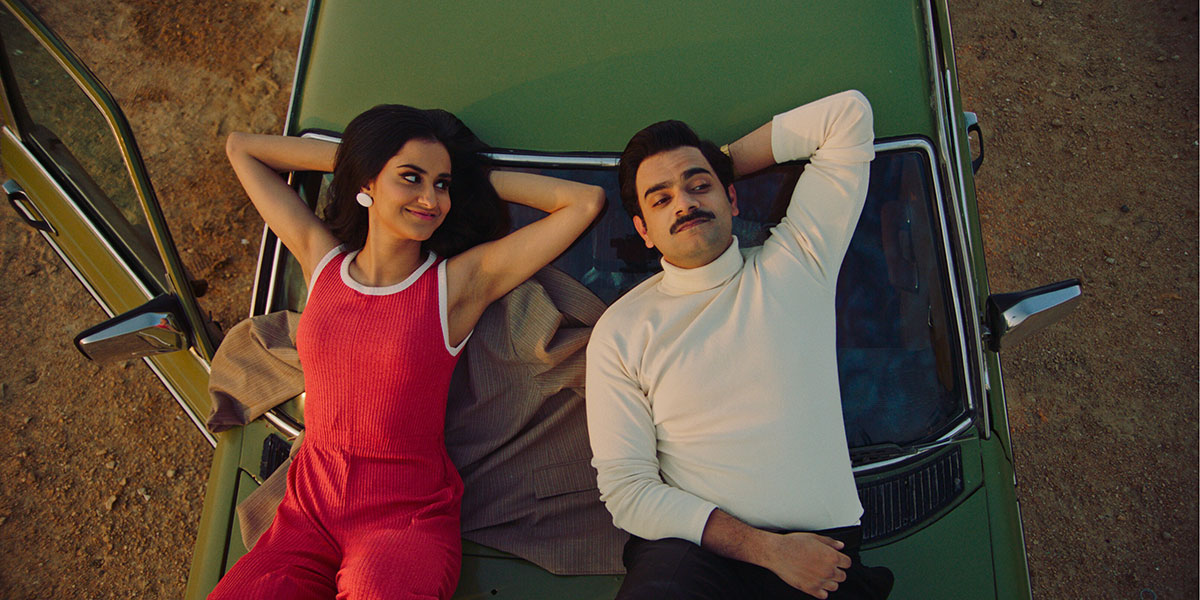After directing and writing many projects, including the delightful short The Syed Family Xmas Eve Game Night, Fawzia Mirza made her feature film debut in September at the Toronto International Film Festival (TIFF) with The Queen of My Dreams. It’s a story that weaves together intergenerational relationships set within Pakistani and Canadian cultures and told with Bollywood flair.
When the father of Azra (Amrit Kaur) dies during a trip to Pakistan, she’s forced to journey to the country for the funeral. There, she not only has to adapt to cultural differences and expectations, but she has to face her mother, Mariam (Nimra Burcha), from whom she is worlds apart. Through flashbacks to 1960s Pakistan, interspersed with fantastical scenes inspired by and styled like the Bollywood classic Aradhana, we get to see that when Mariam was Azra’s age, and she was romancing the man who would become Azra’s father, the two women were more alike than Azra could have ever thought.
For Mirza, the premiere of the film at TIFF was a full-circle moment. The screenplay started its TIFF journey at the festival’s Writer’s Studio in 2020, and back then she was looking for a director, but to no avail. “I was searching for someone who was Muslim, queer and South Asian,” she tells Xtra. But then she recalls someone telling her that she “was talking about the project like I was directing it, and there was no one else who should do it,” which she took to heart.
One of the highlights of The Queen of My Dreams is its inspiration from Bollywood, which Mirza used as the basis for more than just the film’s title (a direct translation of the song “Mere Sapnon Ki Rani,” from Aradhana), but also its Technicolor cinematography and musical sequences that place the characters in the middle of their own Bollywood fantasy. These musical moments help separate the 1960s story from Azra’s present-day experience in Pakistan. Mirza also honours the Bollywood tactic of doubling, where a central actor plays multiple roles, in having Kaur play both Azra and Mariam in 1960s Pakistan, and Hamza Haq playing both Kaur’s father, past and present.
“I’ve always found it really fascinating, how in South Asian cinema we just accept fantasy, we just accept things that are beyond reality and beyond the confines of what we know is real,” Mirza explains. “As I thought about casting, I really wanted to pay homage to and to reference the fantasy world in different ways. Once I decided that I wanted the doubling, it felt so obvious.”
And although the film incorporates Bollywood fantasy elements, at its heart is a story that hits close to home. Both Azra and Mirza are queer women, both grew up with parents raised in Pakistan who moved to Canada and both had to go to Pakistan to bury their fathers. “Those are all characteristics and identities I share, but also the film is personal in its collective history, collective memory,” Mirza says, referencing the film’s depiction of 1960s Pakistan, often considered the country’s golden era.
Western bias toward and stereotypes of South Asian cultures haven’t allowed Western audiences the opportunity to properly get to know the people or culture of South Asia. But what we see in the film, through the eyes of young Mariam flirting with her prospective husband, is a liberated and open Pakistan that allows Mariam the opportunity to choose whom she marries, (secretly) drink with her friends and lead a relatively secular life as a Muslim—albeit with a dash of fantasy. In one scene, there’s a brief interaction between Mariam and a trans woman who helps her with her hair. This simple, yet powerful, inclusion of a trans character is a reminder to audiences that trans life and people have been a part of many cultures, including Pakistan’s, for thousands of years.
“As a South Asian person, there’s been an embracing of, and knowing of, trans people as people since the beginning of humanity on this earth,” Mirza says. And although the character’s gender identity is never mentioned, her inclusion is paramount in helping the world normalize trans and queer identities. As is Azra’s relationship to her queerness, and the journey she goes on in flashbacks of growing up and figuring out her identity in Canada, shortly after her parents emigrated from Pakistan.
But at its core, this film is about intergenerational relationships. Motherhood, daughterhood and everything that surrounds them. And although this is a story of how these women became who they are, a question Mirza often explores in her work, it is not a “queer” story. Too often, people think that a film about a queer person (or by a queer person, for that matter) has to be about their identity, where this question of whom someone sleeps with is, somehow, more important than the story itself. In allowing more queer filmmakers into the industry, we’re experiencing the beginning of an era where their stories aren’t defined by their queerness, but shaped by queer experiences. “I truly believe that embracing my queerness helped me embrace all of my other identities, being South Asian and Muslim. It gave me the freedom to be whoever I wanted to be,” Mirza says.
By having that freedom, Mirza has taken her own experiences and spun them into a beautiful story that embraces multiple cultures, identities and lifestyles. It’s a movie that’s filled with heart and gives us hope for what the future of storytelling looks like. “This film was made with great love. Great love for self, but also great love for mothers, and great love for the Motherland. I hope that’s also how people receive it, and that they can find love for themselves, their ancestors and where they come from.”
The Queen of My Dreams is now playing across Canada.


 Why you can trust Xtra
Why you can trust Xtra


